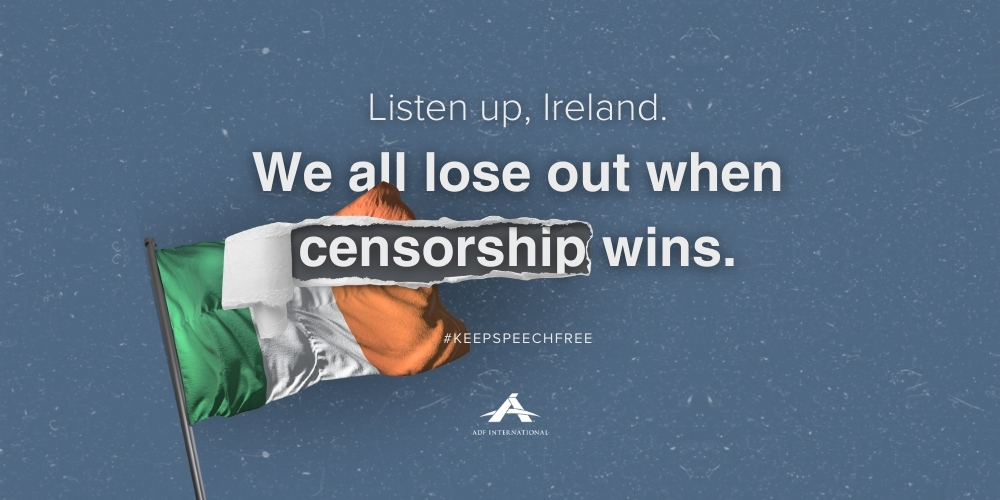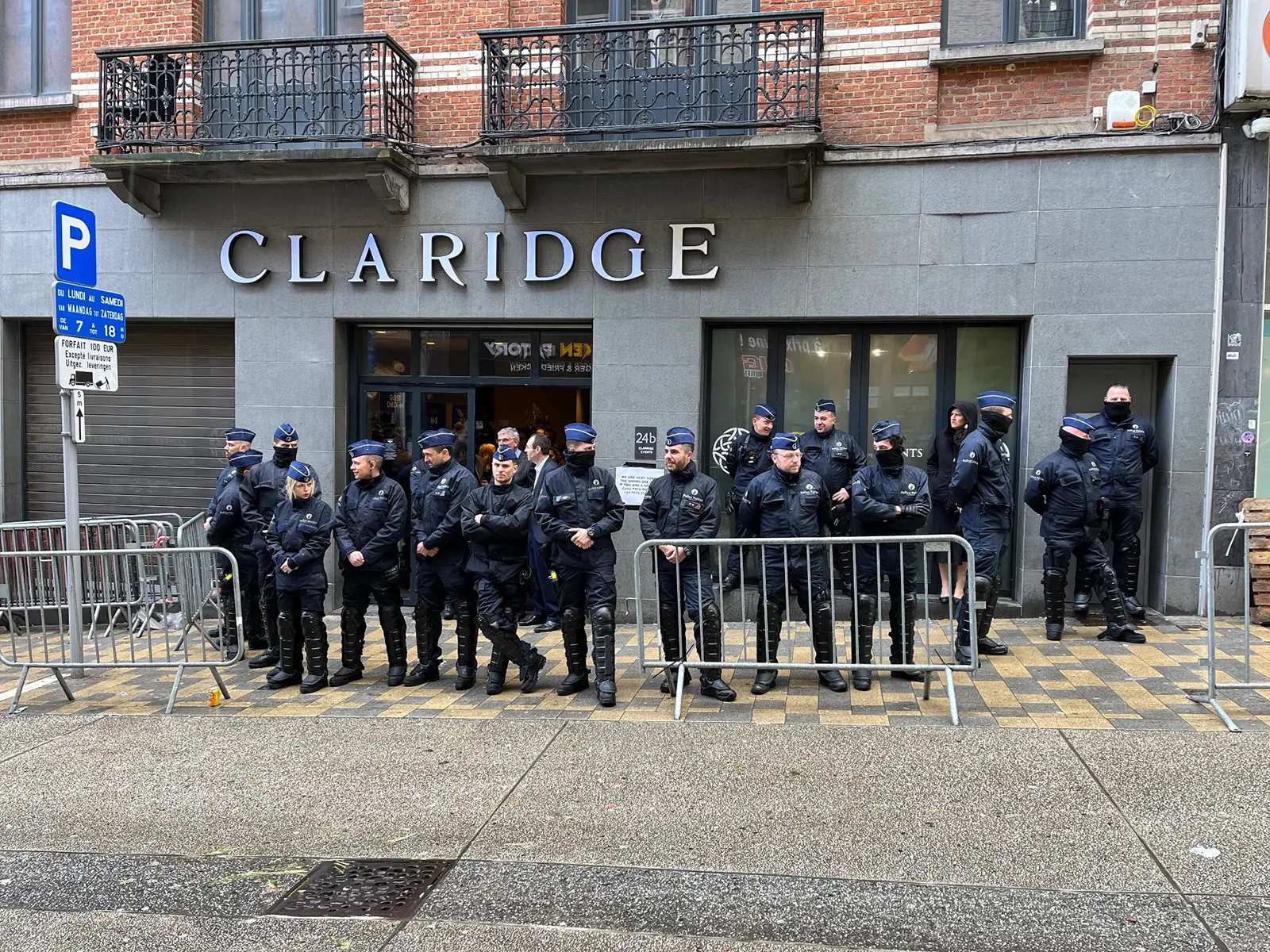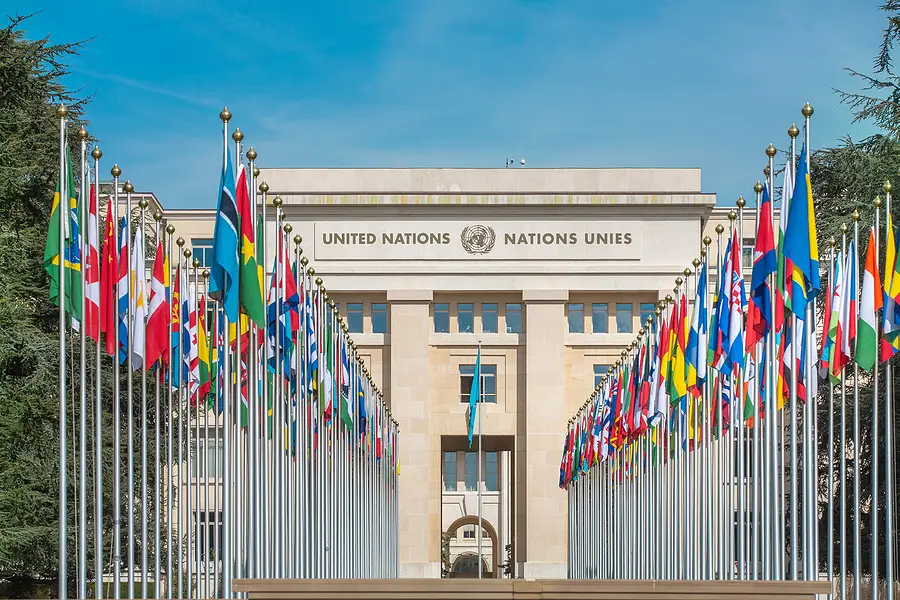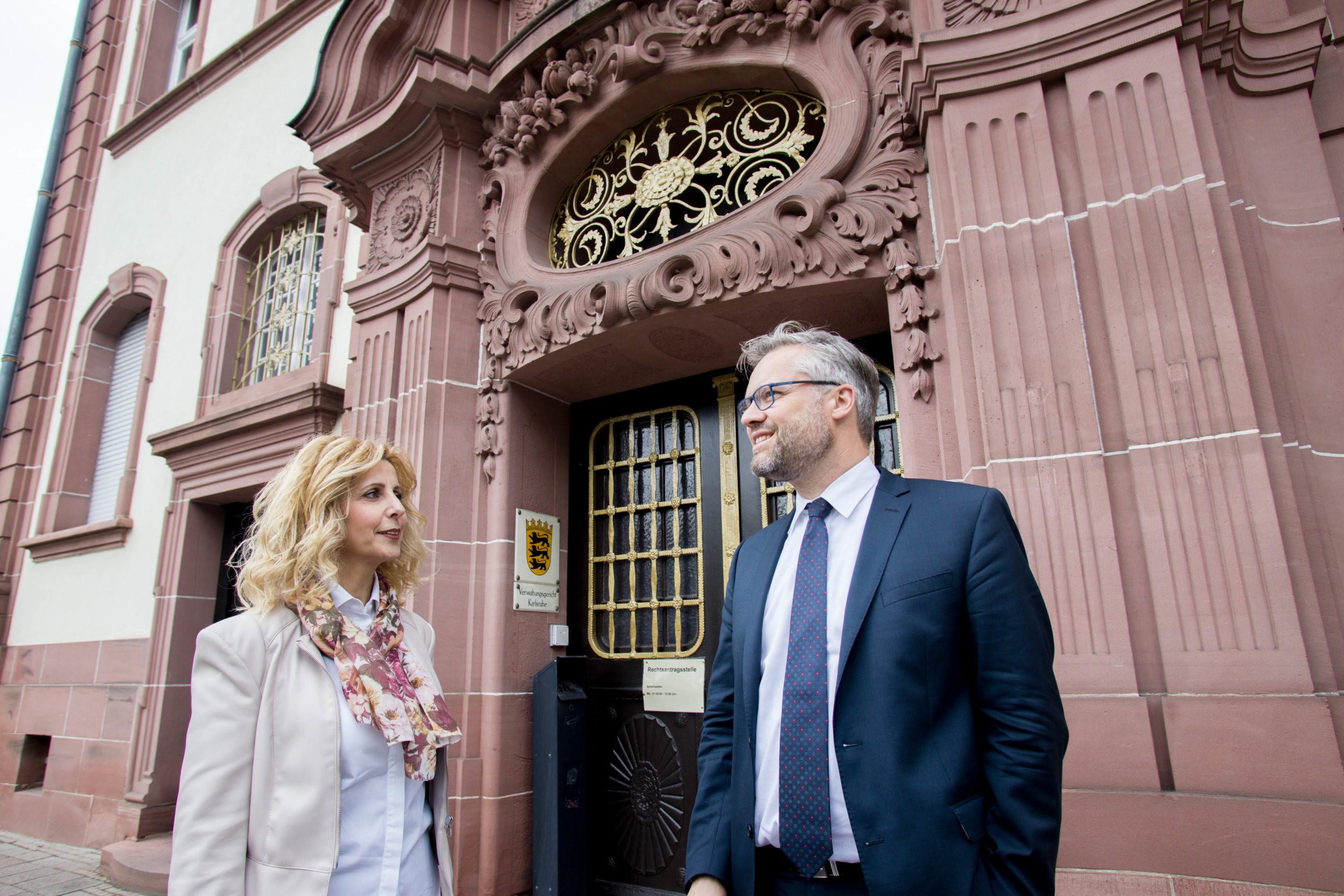Court upholds the right of federal congress member Gabriel Quadri to run for office following attempts from gender ideologists to bar him from June elections.
Continue readingBible-tweet case to be heard at Finnish Supreme Court
Long-serving Parliamentarian and grandmother Päivi Räsänen to stand trial a third time for expressing Christian beliefs on marriage and sexuality on “X” (formerly Twitter)
Continue readingFree speech PREVAILS for “NatCon”: Belgian court strikes down order shuttering conservative conference
Belgian court upholds emergency late night legal challenge, allowing conference “cancelled” by authorities to freely meet today without interference.
Continue readingNEW: ADF International backs emergency legal challenge after Brussels police shut down “NatCon” conference citing views on abortion, marriage, and the European Union
Police ordered to shut down peaceful conference because it platformed views that were “ethically conservative”.
Continue readingThe Irish “hate speech” bill encourages censorship rather than combatting hate
Inform yourself about the Irish “hate speech” bill, and you’ll find the censorial truth.

Censorship. It’s an elusive term animated throughout history with growing relevance today. “Hate speech” laws loom large over Western political and social conversations. Blasphemy laws criminalize faith-based speech and belief in countries like Nigeria and Pakistan. By now, almost everyone is aware of censorship.
Some may think of George Orwell’s 1984; others, Ray Bradbury’s Fahrenheit 451. Censorship takes many forms – like book burning and imposing “newspeak” – but Ireland now leads the dystopian cause with its hotly debated “hate speech” bill.
And so, as the state-driven tide of censorship sweeps the world, Europe stands at the forefront of the ongoing conversation. Why? Because almost every Western nation has introduced “hate speech” laws enabling authorities to enforce penalties for certain speech they deem unpopular or unorthodox.
These laws are introduced under the guise of combatting “a rise of hate”, or offensive speech that can make people feel insulted or uncomfortable. But criminalizing speech is not the answer. Rather, allowing more robust speech that facilitates open debate instead. That’s why we stand against so-called “hate speech” laws like the proposed one in Ireland.

By loading the video, you agree to YouTube's privacy policy.
Learn more
The Irish “hate speech” bill seeks to criminalize the possession of material “likely” to incite hatred. This includes memes and photos saved on devices, with up to five years of jail time. Yes, photos on personal devices. Yet, there is no clear definition of what “hate” entails.
Therefore, this is a dangerous trajectory. ADF International highlights the dangers of the “hate speech” bill while briefing Irish lawmakers on how to uphold freedom of speech.
What are “hate speech” laws?
So-called “hate speech” laws are ambiguously worded laws that criminalize certain speech beyond what is acceptable in a democratic society.
Despite having no basis in international law, all European Union Member States have vague and subjective “hate speech” laws. The United Nations, EU, and Council of Europe concur that “hate speech” lacks a universally agreed-upon definition. Nonetheless, the European Commission seeks to make “hate speech” an EU-wide crime on the same list as trafficking and terrorism.
These laws, with the right police and prosecutor, can be weaponized against any person and any form of speech. Thus, explicitly violating the state’s obligation to protect free speech.
Do “hate speech” laws deter hate?
The short answer is no. But because “hate speech” laws rely on vague terms such as ‘insult,’ ‘belittle,’ and ‘offend,’ they are inconsistently interpreted and arbitrarily enforced. Oftentimes, the threat of serious criminal penalties accompanies charges.
Rather than combat hate, the criminalization of speech based on subjective criteria creates a culture of fear and censorship.
An offence is considered hateful in reference to the hearer or reader, making it subjective with little to no regard for the content of the speech itself. They are incompatible with free societies.
How the proposed Irish "hate speech" law is different than others
The Irish “hate speech” bill would move the needle further. If passed, we could expect commonplace prosecutions like Päivi Räsänen’s for posting a Bible verse on “X” in 2019 about her biblical worldview on marriage and sexuality. In fact, Ireland’s censorial law would go even further than Finland’s.
We’re ramping up public advocacy to expose the unprecedented dangers of what the Irish government is doing. All have the right to live and speak the truth without fear of censorship or retaliation. That’s why we’re asking Irish lawmakers to uphold their obligation to protect free speech under international human rights law.
Consequently, the Irish “hate speech” bill has two major facets that other laws like Finland’s do not include. For example:
- It leaves the issue of gender open-ended by including a list of “protected characteristics” allowing for unlimited “gender identities” like ‘non-binary’ and ‘two-spirit’. These self-identities would receive protection supported by criminal law.
- It allows authorities to criminalize private possession of memes or any content “likely” to incite violence or hatred “…against a person or group of persons on account of their protected characteristics”.
This means “misgendering” someone could land you a fine or worse, criminal prosecution. If the Irish “hate speech” bill becomes law, Irish police would have the power to search phones, camera rolls, and emails for prosecutable content.
It’s paramount that we all spread awareness about the dangers of this bill.
Why Ireland is pushing this now
The Irish government claims that the law is necessary following rising incidents of violence in the country, which many tie to uncontrolled migration. But peace and security on the streets do not require “hate speech” laws suppressing peaceful speech.
With key terms deliberately undefined, how are we to know what kind of speech could be subject to prosecution? “Hate speech” laws are Western blasphemy laws by another name; both are state driven.
The thought of Irish police raiding homes and phones to seize banned books and memes invokes thoughts of Orwell and Bradbury and the darker moments of the last century.
Our right to freedom of expression is protected by numerous international human rights treaties. The European Court of Human Rights even affirmed that the right to freedom of expression protects not just popular ideas but also those that shock, offend, and disturb.
Yet, some argue that unpopular speech should be censored by the state. But where is the logical stopping point?
Have we learned nothing from Finland?
“Hate speech” laws are detrimental to a society seeking to protect freedom of speech or thought. In Finland, we’ve supported Päivi’s defence for almost five years with two unanimous acquittals. She was charged with three counts of “hate speech” because of her “X” post, a pamphlet she authored for her church, and comments she made during a radio programme.
In January 2024, the state prosecutor appealed her case to the Finnish Supreme Court. On 19 April, the high court agreed to hear the appeal, so Päivi will face her third criminal trial in three years. However, the legal process is Päivi’s punishment because the state has unlimited funds to prosecute offenders of their “hate speech” laws. Prosecutions cost taxpayer funds, while reputations sometimes become irreparably harmed.
If Päivi’s now famous “hate speech” case took place in Ireland, she could be prosecuted for simply possessing the pamphlet she wrote for her church congregation on the biblical definition of marriage, even if it was never published online.
Ireland should be a place where important conversations about issues that matter – even about controversial and sensitive topics thrive. When these conversations are shut down, we all lose out.
Conclusion: Ireland must reject its new “hate speech” bill
In summary, “hate speech” laws leave the door wide open to state censorship and oppression. And yet, the Irish government has been moving forward with a new bill to criminalize “hate speech” since 2022.
This could be one of the most far-reaching clampdowns on free speech by a modern democracy. It implicates memes, jokes, and books. Instead of protecting free speech and public safety, this law is poised to set a draconian precedent of intolerance against those who express beliefs outside the state-approved orthodoxy.
Unpopular speech needs the most protection, and in a free society, free speech is required. Individuals should be able to express their beliefs without fear or oppression. The Irish “hate speech” bill is a far cry from the liberal democratic ideals the Irish government claims to profess.
WHO pandemic treaty negotiations resume while concerns mount about censorship threats: “cure cannot be worse than the disease”
WHO pandemic treaty draft threatens freedom of expression by requiring governments to manage “infodemics” defined as “too much information”.
Continue readingGermany plans to unveil censorship zones which violate freedom of speech and free assembly
All of Germany must reject this bill because whether pro-life or not, censorship zones would ensnare everyone
-
 Paul Coleman
Paul Coleman

The German government is planning to introduce so-called censorship zones in certain locations – just like the UK. These censorship zones around abortion facilities are established to silence the pro-life view. These zones are not “pro-choice”, they’re no-choice.
And their actions deliberately ignore recent rulings by the Federal Administrative Court. Several weeks ago, the federal government approved a draft law on censorship zones to be established in certain locations in front of and around German abortion-related facilities in which certain opinions can no longer be expressed and certain peaceful activities prohibited.
What are censorship zones?
Censorship zones are areas defined by the local administration or even the legislature where specific opinions, actions or gatherings are prohibited. These zones censor certain expressions of opinion, hence the name ‘censorship zone’.
A look at Great Britain shows where restrictions on peaceful prayers can lead. In recent months, several people have been arrested there due to local censorship zones. The arrests occurred because individuals were quietly praying on a public street. The zones there have led to even silent prayer and, thus, thoughts being criminalized. We must not stand for this. Here’s why:
Censorship zones violate fundamental freedoms
Censorship zones are advanced under the guise of protecting women, but they are levied against peaceful individuals who in no way condone the harassment of women. After all, harassment is already prohibited under German criminal law.
What is most dangerous, however, is the fact that certain opinions are banned because they’re unpopular. Even if we disagree on abortion, we should agree that basic human rights—like free expression and free thought—are too important to throw out the window.
We all have the basic human right to think, act, and pray in accordance with our convictions.
Only recently, the Federal Administrative Court confirmed the right to freedom of assembly and freedom of opinion of a pro-life prayer group.
They gathered across the street from an abortion facility and quietly prayed. The police did not find harassment while observing the group in Pforzheim.
Similarly in the UK, A pro-life activist is being investigated for a third time for praying silently in a censorship zone.
She had nothing with her, did not prevent women from entering the abortion facility, and did not even speak to anyone. A silent prayer in her mind was enough to bring her to court – a serious violation of freedom of thought.
Censorship zones are clearly having serious consequences for fundamental freedoms in the UK and we cannot let the same thing happen in Germany.
These zones silence without offering help
Censorship zones do nothing to protect women. Rather, they block women from hearing about the offers of help available to them.
The sad reality is that these zones fail the women who choose abortion out of a sense of helplessness. By banning peaceful offers of help and alternative options, many women will feel even more alone.
Shouldn’t women in crisis pregnancies have access to help and alternative options to abortion?
If the state can ban freedom of expression and assembly in front of certain establishments, why not in other places?
There is no logical endpoint for such censorship
Freedom of expression, assembly, and freedom of religion benefit all people. These fundamental rights cannot be restricted under the pretext of harassment – which is already a criminal offence.
This bill is aimed at silencing pro-life views, to get those who stand up for the lives of the unborn to self-censor and remain silent. That’s why we’re pushing back against these censorial laws – will you help us?
The bill, which was approved by the cabinet on January 24th, 2024, will now be forwarded to the Bundesrat, which can already introduce amendments. This will be followed by the legislative process in the Bundestag, which will end with a vote on the law.
As the legal impact of these zones becomes clear, we must remain committed to defending the basic human right to free expression, including preventing the proliferation of “thought crimes” where people can even be prosecuted for silent prayer.
Will you stand alongside us for the protection of freedom of expression and freedom of assembly?
We must stand up for our fundamental rights together.
Global voices unite for free speech following Musk’s commitment to challenge “draconian” Irish “hate speech” law
Seth Dillon, Ashley St. Clair, Sara Gonzales, & Andy Ngo among others joining ADF Intl in calling on Ireland to abandon far-reaching censorship bill
Continue readingGerman government announces draft law introducing censorship zones around abortion-related facilities, fines up to 5,000€
- Proposed bill would criminalize charity volunteers praying and offering help, including vague ban on words, signs, and messages that could be potentially “confusing”
- Legal expert Dr. Felix Böllmann: “Any form of harassment is obviously already forbidden. Peaceful prayer and offers of help, however, are strongly protected under the law”.
BERLIN (29 January 2024) – A new draft bill, announced last week by Germany’s Federal Family Minister Lisa Paus (Green Party), would introduce fines of up to 5,000€ ($5,500) for peaceful expression on public streets near abortion-related facilities. The bill would seek to create nationwide censorship zones around the facilities, criminalising messages that could be subjectively understood as “disturbing” or “confusing,” with no legal clarity as to how those terms are to be interpreted. Harassment is already fully illegal, independent of the proposed new law, which would target peaceful expression. The Federal Cabinet approved the bill last week. It will now move through the Bundesrat (Federal Council), which can introduce amendments, followed by the legislative process, including three readings in the Bundestag (Parliament).
The UK Parliament adopted “buffer zone” legislation in 2023, expected to come into force throughout all of England and Wales soon. Existing zones under local laws already have resulted in numerous human rights violations including police interrogations, arrests, fines and criminal proceedings for silent prayer on the public street near abortion facilities, essentially resulting in “thought-crime” prosecutions. Currently, army veteran Adam Smith-Connor is awaiting trial for silent prayer in Bournemouth, England.
Germany’s proposed new law would be in direct contravention to a 2023 decision from the country’s top administrative court upholding the freedom of assembly across the street from an abortion facility. The ruling affirmed the rights of Pavica Vojnović and her 40 Days for Life prayer group, which conducted silent prayer vigils on the public street in Pforzheim, Germany. Such an exercise of basic human rights would likely run afoul of the proposed new legislation.
“Peaceful gatherings, prayer and offers of help should never be banned. The plans of the German government are alarming—not only do they put blanket restrictions on fundamental freedoms, but also they weaken civil society’s engagement for the protection of the right to life. Any form of harassment is obviously forbidden. But censorship zones are not pro-choice, they are no-choice and have no place in a free and democratic society,” said Dr. Felix Böllmann, German lawyer and Director of European Advocacy at ADF International.
Bill contradicts court rulings
In recent years, ADF International has supported the legal defense of pro-life volunteers in Germany who exercised their right to pray peacefully, including in silence, in front of abortion-related facilities. Germany’s top administration court confirmed that blanket bans on prayer gatherings are impermissible. According to the court, there is no “right to be buffered from dissenting opinions”. The new bill goes far beyond criminalising already illegal harassment to propose blanket bans on peaceful and fully legal activities such as prayer or offers of help.
The draft bill thus contradicts standing court ruling upholding freedom of assembly and free expression on the public street in the vicinity of an abortion-related facility absent manifest infringements of third party rights.
Restricting free expression supports abortion lobby
“Standing law in Germany obliges the state and civil society to protect unborn life. Committed pro-life individuals must not be criminalized for the peaceful expression of their convictions. Every human being has dignity and a right to life, from the moment of conception. The state and citizens should work together to protect life. Instead, people with civil courage to uphold the fundamental right to life are now being deterred, and even potentially criminalised, for their commitment,” said Ludwig Brühl, German Communications Officer for ADF International.
“We stand with the right of every person, including peaceful pro-life advocates, to freely express their convictions. The freedoms of assembly, opinion, and religion benefit all people. That is why we are defending these core human rights from the encroaching plans of lobby organizations and ideologues,” concluded Dr Felix Böllmann.
Prosecutor appeals Bible-tweet case to Finnish Supreme Court
State prosecution against Finnish parliamentarian Päivi Räsänen and Bishop Pohjola continues, despite Appellate Court confirming unanimous “not guilty” ruling
Continue reading











